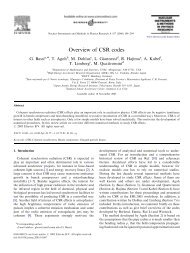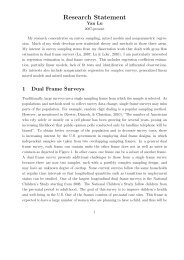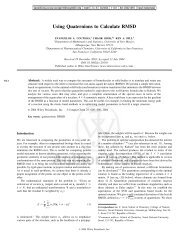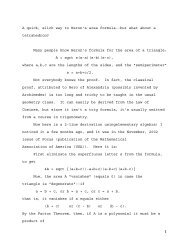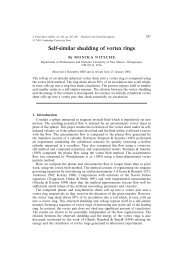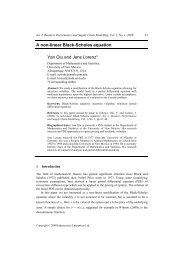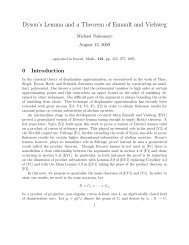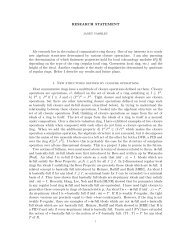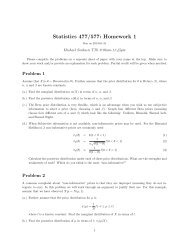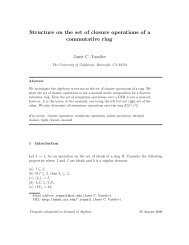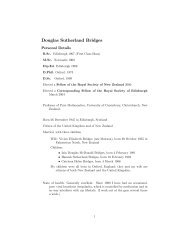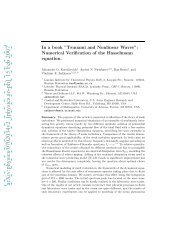OEO Office of Equal Opportunity - Department of Mathematics and ...
OEO Office of Equal Opportunity - Department of Mathematics and ...
OEO Office of Equal Opportunity - Department of Mathematics and ...
Create successful ePaper yourself
Turn your PDF publications into a flip-book with our unique Google optimized e-Paper software.
154 ARTS AND SCIENCES<br />
A. The B.S. Program requires a minimum <strong>of</strong> 37 credit<br />
hours earned in biology courses. These courses must<br />
include [201, 202, 203L, 204L]; at least one <strong>of</strong> the following:<br />
351 <strong>and</strong> 352L, 360L, 371L, 386L. The remainder<br />
hours are to be earned in elective biology courses.<br />
(BIOC 423 may be included.)<br />
B. In order to satisfy an upper-division breadth requirement<br />
for the Biology major, a total <strong>of</strong> two <strong>of</strong> the 400-level<br />
courses that are specifically listed below must be successfully<br />
completed. In addition, the chosen courses<br />
must be taken from two different categories (i.e.,<br />
completing two courses that are both grouped within a<br />
single category will NOT satisfy this requirement).<br />
1) Cell/Molecular (410, 412, 425, 428, 429, 444, 446,<br />
449, 450, 466, 490, 497)<br />
2) Physiology (416L, 435L, 443, 447, 456, 460, 471,<br />
478L)<br />
3) Organismal (448, 463L, 474L, 482L, 485L, 486L,<br />
487L, 488L, 489L)<br />
4) Ecology/Evolution (403, 407L, 408L, 418, 436L,<br />
437, 440, 451, 455, 461L, 465, 467, 475, 494, 495)<br />
C. Required Supportive Courses for the B. S.: MATH 180-<br />
181 or 162-163; PHYC 151-152 (or 160-161); CHEM<br />
121L-122L (or 131L-132L) <strong>and</strong> 301-303L (or 212). (For<br />
those interested in microbiology, molecular/cellular<br />
biology, physiology or medicine, CHEM 301-303L <strong>and</strong><br />
302-304L are recommended.)<br />
D. The. B.A. Program requires a minimum <strong>of</strong> 32 credit<br />
hours earned in biology courses. These courses must<br />
include [201, 202, 203L, 204L]. The remainder <strong>of</strong> the<br />
total required credit hours is to be earned in elective<br />
biology courses. The elective courses must include two<br />
upper division courses (300 or 400 level) each <strong>of</strong> which<br />
carries at least 3 credit hours <strong>and</strong> is exclusive <strong>of</strong> BIOL<br />
400, 402, <strong>and</strong> 499. (BIOC 423 may be included.) (BIOL<br />
110, 112L, 123L <strong>and</strong> 239L are not allowed for biology<br />
major credit.)<br />
E. Required Supportive Courses for the B.A.: [MATH 180<br />
or MATH 162 <strong>and</strong> STAT 145 or CS 150L ] (or MATH<br />
180-181); PHYC 102 <strong>and</strong> one <strong>of</strong> the following: EPS 101<br />
(or PHYC 151-152); CHEM 121L-122L (or 131L-132L)<br />
<strong>and</strong> CHEM 301-303L (or 212).<br />
For both the B.A. <strong>and</strong> B.S., a grade <strong>of</strong> C or better is required<br />
for: i) the Biology core ([201, 202, 203L, 204L]), ii) all required<br />
supporting courses in Computer Sciences, Chemistry, Earth<br />
<strong>and</strong> Planetary Sciences, <strong>Mathematics</strong>, <strong>and</strong> Physics; <strong>and</strong> iii)<br />
all elective courses in Biology. No credit toward the major will<br />
be given for courses completed with a grade <strong>of</strong> C- or below.<br />
Transfer students must obtain 19 Biology credits at UNM<br />
for the B.S., or 16 credits for the B.A. Only Biology courses<br />
completed within the previous ten years will apply.<br />
Areas <strong>of</strong> Emphasis<br />
The courses <strong>of</strong>fered by the Biology <strong>Department</strong> can be used<br />
to pursue specialized programs in the following areas: Botany,<br />
Computational Biology, Evolution/Ecology, Microbiology,<br />
Molecular/Cellular Biology, Physiology, Systematics, <strong>and</strong><br />
Zoology. <strong>Department</strong>al advisement is recommended for students<br />
who wish to complete one <strong>of</strong> these informal specializations.<br />
A formal concentration in Conservation biology is also<br />
<strong>of</strong>fered (see below).<br />
Concentration in<br />
Conservation Biology*<br />
The growing emphasis on Conservation in the biological<br />
sciences supports this concentration. Students may receive<br />
either the Bachelor <strong>of</strong> Science or Bachelor <strong>of</strong> Arts degree in<br />
Biology with a concentration in Conservation Biology. The<br />
concentration provides students with a strong background<br />
in biology as well as the complementary interdisciplinary<br />
skills critical to underst<strong>and</strong>ing <strong>and</strong> addressing contemporary<br />
conservation questions.<br />
Majors in biology seeking a Bachelor <strong>of</strong> Science degree<br />
with a concentration in Conservation Biology must satisfy<br />
the requirements given in sections A, B, C <strong>and</strong> F. Majors in<br />
biology seeking a Bachelor <strong>of</strong> Arts degree must satisfy the<br />
requirements in sections D, E, <strong>and</strong> F.<br />
A. The B.S. Program with a Concentration in Conservation<br />
Biology requires a minimum <strong>of</strong> 45 credit hours earned<br />
in biology courses. These courses must include: [201,<br />
202, 203L, 204L], 310L, 360L, 379 ; at least one <strong>of</strong><br />
following: 351 <strong>and</strong> 352L, 371L, 386L; A minimum <strong>of</strong><br />
3 credit hours must be from the Conservation Biology<br />
Seminar 402; this 1 credit course must be taken at least<br />
once a year in the second through fourth years <strong>of</strong> the<br />
degree program. The remainder <strong>of</strong> the total required<br />
credit hours are to be taken from a list (available from<br />
the Biology <strong>Department</strong>) <strong>of</strong> restricted elective courses.<br />
B. In order to satisfy an upper-division breadth requirement<br />
for the Biology major, a total <strong>of</strong> two <strong>of</strong> the 400-level<br />
courses that are specifically listed below must be successfully<br />
completed. In addition, the chosen courses<br />
must be taken from two different categories (i.e.,<br />
completing two courses that are both grouped within a<br />
single category will NOT satisfy this requirement).<br />
1) Cell/Molecular (410, 412, 425, 428, 429, 444, 446,<br />
449, 450, 466, 490, 497)<br />
2) Physiology (416L, 435L, 443, 447, 456, 460, 471,<br />
478L)<br />
3) Organismal (448, 463L, 474L, 482L, 485L, 486L,<br />
487L, 488L, 489L)<br />
4) Ecology/Evolution (403, 407L, 408L, 418, 436L,<br />
437, 440, 451, 455, 461L, 465, 467, 475, 494, 495)<br />
C. Required Supportive Courses for the B.S.: MATH 180-<br />
181 or 162-163; PHYC 151-152 (or 160-161); CHEM<br />
121L-122L (or 131L-132L) <strong>and</strong> 301-303L (or 212).<br />
D. The B.A. Program with a concentration in Conservation<br />
Biology requires a minimum <strong>of</strong> 36 credit hours earned<br />
in biology courses. These courses must include: [201,<br />
202, 203L, 204L], 310L, 360L, 379; <strong>and</strong> at least one <strong>of</strong><br />
the following: 351 <strong>and</strong> 352L, 371L, 386L, <strong>and</strong> at least<br />
one <strong>of</strong> the following: 435L, 460, 478L. A minimum <strong>of</strong><br />
3 credit hours must be from the Conservation Biology<br />
Seminar 402; this 1 credit course must be taken at least<br />
once a year in the second through fourth years <strong>of</strong> the<br />
degree program. The remainder <strong>of</strong> the total required<br />
credit hours are to be taken from a list (available from<br />
the Biology <strong>Department</strong>) <strong>of</strong> restricted elective courses.<br />
E. Required Supportive Courses for the B.A.: [MATH 180<br />
or MATH 162 <strong>and</strong> STAT 145 or CS 150L ] (or MATH<br />
180-181); PHYC 102 <strong>and</strong> one <strong>of</strong> the following: EPS 101<br />
(or PHYC 151-152); CHEM 121L-122L (or 131L-132L)<br />
<strong>and</strong> CHEM 301-303L (or 212).<br />
F. C<strong>and</strong>idates for both the B.A. <strong>and</strong> the B.S. degrees in<br />
Biology with a concentration in Conservation Biology<br />
must take a minimum <strong>of</strong> 6 credit hours to be taken from<br />
the following list <strong>of</strong> complementary interdisciplinary<br />
electives: ANTH 261; ECON 203, 342; EPS 203, 333;<br />
PHIL 363; POLS 475.<br />
Grade <strong>of</strong> C or better required in all <strong>of</strong> the above courses.<br />
*NOTE: <strong>Department</strong>al advisement is required for<br />
students who wish to complete the concentration in<br />
Conservation Biology.<br />
Minor Study Requirements<br />
BIOL [201, 202, 203L <strong>and</strong> 204L], plus 6 additional hours<br />
<strong>of</strong> biology. (BIOL 110, 112L, 123L, 239L, <strong>and</strong> 499 are not<br />
allowed for biology minor credit.)<br />
Grade <strong>of</strong> C or better required in all courses counted for the<br />
minor. Transfer students must obtain 6 Biology credits at<br />
UNM.<br />
UNM CATALOG 2006–2007 Symbols, page 611.



